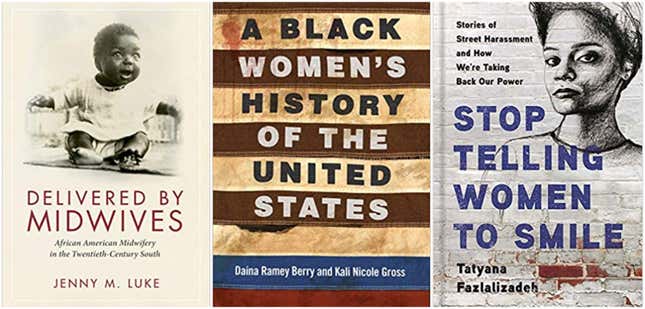Screenshot: University Press of Mississippi (Amazon), Beacon Press (Amazon), Seal Press (Amazon)
Black History Month may be over, but for black women (and those who love them), the party’s only half-over, because March is Women’s History Month—and ain’t I a woman anyone ’s mules, but we are arguably the backbone of the United States and myriad social justice movements within it. Historically, ours were the hands that raised not only our own families but generations of America’s leadership. Now, we are one of the most powerful voting blocs
Black history is American history; similarly, black women’s history is women’s history. With that in mind, we’ve compiled a collection of new (and new-ish) books that celebrate the impact, influence, and experiences of black women in America—whether as midwives in the 20th-century South or senior advisers in a new-millennium White House. From clapping back at street harassment to declaring black girls’ lives as sacred as any other, these books center the black female experience as central to the American experience...and because we’re both in it and of it, we’re entirely here for it.
Black women have long questioned our roles in (every wave of) feminism, and in Hood Feminism: Notes From the Women That a Movement Forgot Screenshot: Viking (Amazon) Even within the annals of both black and women’s history, there are those who were even further pushed to the fringes. Sadiya Hartman’s Wayward Lives, Beautiful Experiments: Intimate Histories of Riotous Black Girls, Troublesome Women, and Queer Radicals Screenshot: W. W. Norton & Company (Amazon) As the history of the United States is exhaustively recounted, the contributions of black women are generally ignored and overlooked. In A Black Women’s History of the United States , award-winning historians Daina Ramey Berry and Kali Nicole Gross center the stories of all types of black women, revealing that our still-growing power lies in our pragmatism, resilience, and adaptability. “The result is a starting point for exploring Black women’s history and a testament to the beauty, richness, rhythm, tragedy, heartbreak, rage, and enduring love that abounds in the spirit of Black women in communities throughout the nation,” reads a synopsis Screenshot: Beacon Press (Amazon) Susan Rice is nothing if not remarkable; under the Clinton administration, she was one of the nation’s youngest assistant secretaries of state; in Obama’s administration, she was a senior adviser. In Tough Love: My Story of the Things Worth Fighting For Tough Love culminates with an appeal to the American public to bridge our dangerous domestic divides in order to preserve our democracy and sustain our global leadership.” Screenshot: Simon & Schuster (Amazon) Advertisement You can skip ad after 1 second
You can go to the next slide after 1 second
Tatyana Fazlalizadeh first garnered national acclaim with her incredible street art that confronted the casual and menacing misogyny women face daily—and even made its way onto the Netflix reboot of She’s Gotta Have It , as Fazlalizadeh became the artist behind the fictional Nola Darling’s similarly themed guerilla artwork. In the recently published Stop Telling Women to Smile: Stories of Street Harassment and how We’re Taking Back Our Power Screenshot: Seal Press (Amazon) Black women know all too well the entitlement the rest of the world feels to our time, labor, culture and bodies. In jessica Care moore’s We Want Our Bodies Back: Poems (available for pre-order prior to its March 31 release), the acclaimed poet addresses life at the intersection, asking us to understand black women through the lens of the challenges they perpetually face, as reads part of a synopsis Screenshot: Amistad (Amazon) Historically, black women were fundamental in the rearing of both black and white children in the American South. As a black maternal mortality crisis continues to loom in present-day America, author Jenny M. Luke’s Delivered by Midwives: African American Midwifery in the Twentieth-Century South Screenshot: University Press of Mississippi (Amazon) The history of African American midwives is also available to a younger audience, thanks to The Women Who Caught The Babies: A Story of African American Midwives The Women Who Caught the Babies recounts the profound contributions of the black women who “caught” so many babies since our arrival in America, including the midwife who helped birth Greenfield herself. Screenshot: Alazar Press (Amazon) Advertisement You can skip ad after 1 second
You can go to the next slide after 1 second
Where is black women’s place in history? Everywhere, as evidenced by Amazons, Abolitionists, and Activists: A Graphic History of Women’s Fight for Their Rights Hood Feminism Screenshot: Ten Speed Press (Amazon) In a world that all too often adultifies Parable of the Brown Girl: The Sacred Lives of Girls of Color reads an excerpt from Adams’ introduction Screenshot: Fortress Press (Amazon)




